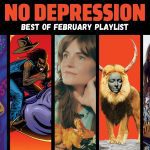Radney Foster Brings Plain Dirt Songs + A Great Big Heart To Beachland Ballroom, Cleveland, Ohio Oct 15
Radney Foster
Beachland Ballroom
15 October
Real life is a tangle of little things that never seem to mean much – until they create a tipping point or “A-Ha!” moment. For Radney Foster, a singer/songwriter and judge’s son from Texas who was half of the late-80s progressive retro-country duo Foster & Lloyd, those tangles are fertile soil for the songs he writers about the state of the human heart, interpersonal dynamics and growing in the face of getting by.
Certainly those themes were on full display at the Beachland Ballroom, a Slovenian meeting hall in the slightly rundown fringe of Cleveland, Ohio. For a city that’s hard-fought to get by, Foster’s songs are a mirror of the faith, depth and passion it takes to carve meaning from one’s time on Earth.
Opening with the plain-spoken declaration, “I’m Radney Foster,. I’m from Del Rio, Texas” and a crisp downstroke, the bespectacled musician embarked on “Redemption,” a song celebrating lost souls making a stand, second chances and the global universality of moral right. After a verse about small town heroes, he threw back his head and sang, “Beirut, Tiannemen Square, all because somebody decided to stand up somewhere…” connecting the dots of bravery from where we are to what we see on CNN – and emboldening his listeners in the process.
Though he joked “this is everything I could steal from Johnny Cash without getting sued,” as he introduced “Until It’s Gone,” the song played as a grass roots manifesto about living full and out loud. With a thrusting rhythm and that drawl played for all it’s worth, the brio was accessible to anyone listening who was willing to through caution to the wind, turn up the volume and live with just a bit more gusto.
For all Foster’s aw shucks patter – and he has the charm of a sweet-talkin’ Texan who’s more broken-in work gloves than shiny belt-buckle, his music is much more a validation of faith, hard work, tough lessons, the sweetness of true love and the courage it takes to stare down one’s fear. Never making anything a big deal (he refers to the benefits of a Keith Urban single as “the Keith Urban Memorial Kitchen”), his reality is meant to be cozy and inviting, a place anyone who choose to listen can inhabit.
Certainly the slow burning ardor of “Raining On Sunday,” the kitchen-providing Urban single, has a darkness and need to it that is as much about carnal deliverance as it is whiling away a few sodden hours on a languid afternoon. Equally smoldering was “I Knew You That Way,” a new song, of what was, how that memory still burns and the way raw desire first quenched changes you forever… and remains a truth of what can be that guides you always.
Still, Foster’s love is not just of the romantic or lustful vein. He embraces a son across the Atlantic in the nursery rhyme bed time currency of “Godspeed,” a hit for the Dixie Chicks, an homage to the service men who fly their fallen brethren home in the deeply dignified “Angel Flight” or the transiting generational roles that makes up the connective “I Know You Can Hear Me,” as father and son change places, dynamics and love from childhood through the elder’s passing.
Foster has had two lives on the radio – the aforementioned duo and as a solo artist during the 90s – and has decided he prefers the ranks of a sekf-supporting singer/songwriter. It is an ironic note that most of his recent solo work is strikingly in line with his solo “hits,” a commentary on the machined confectionary that is so much country radio.
Still the Wurlitzer country of the shattered relationship that is “Easier Said Than Done,” featuring the earthy sensuality that is Kim Richey on harmony vocals, had all the tears of a tube radio classic – especially given the close formation harmonies of good friends who know each other inside out and understand the pain the other finds in the song, while the 2-step friendly “Just Call Me Lonesome” echoed the best of Dwight Yoakam, the early Mavericks and Buck Owens most rubberized backbeats and the Richey-harmonized and co-written “Nobody Wins” brought all the shimmer that was progressive country filtered through the Byrds, Mary-Chapin Carpenter or Rosanne Cash.
That dexterity pushed the boundaries in ways that expanded the genre, both musically and emotionally. It was the shadowy places that Foster’s music has always explored and the high-flying drama of staking one’s claim. Certainly the F&L book-ends towards sets end defined that reality: from the rodeo-riding bravado of “Texas in 1880” with its strum and pop fury and a chorus that celebrated the blazing hope “to be young & wild & free…” with the knowledge of been there versus the wide-hope of that first Foster & Lloyd album to the aching “You Can Come Crying To Me,” where the innocence of a young man served to buoy a woman lost on a sea of the jagged pieces of a broken romance.
Harlan Howard explained that country music is “three chords and the truth.” Certainly at its stripped down and most essential, the genre is its most potent. But it’s also about how far one is willing to take that truth – and the truth one finds in the how it really is.
For Foster that is most redolent on “Half of My Mistakes,” a philosophical mid-tempo that examines how stuff in his life’s blown up, where it’s lead him and the notion that the learning curve gets you to places you’d’ve never gotten to if you’d not messed up. It is as honest as you get, as real as anybody’s ever lived it, as willing to accept the gettin’ it wrong and also to recognize the gift in the screw-up.
To be able to get through the blame to see the beauty of the sun coming up is perhaps the biggest challenge of all. Just past a quarter of decade doing this for a living, Radney Foster has no vanity about the places where he’s missed the turn, made the bad decision and stood in the wreckage; for him, it was a gateway to where he wanted to be.
And on one night in a long forgotten ballroom with an audience of 400 people hanging rapt, Cleveland, Ohio was just that place. To sing songs, share stories and let people see just how much we all have in common was exactly the reasons he’s still here – making his records his way on his own label, keeping the pilot light of so many strains of classic country alive and giving back what his influences obviously have to him.
— Holly Gleason




